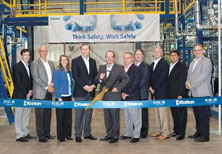
US-based Kraton Performance Polymers, a producer of styrenic block copolymers (SBCs) and other engineered polymers, which recently posted second quarter 2014 sales revenue of US$323.8 million on sales volume of 78.4 kilotonnes, down US$10.8 million compared to the second quarter 2013 on sales volume of 77.5 kilotonnes, has put its plans to merge with Taiwanese rival LCY Chemical Corp. on the backburner.
It notified LCY in July that its Board of Directors intends to withdraw its recommendation that Kraton stockholders approve the previously announced combination agreement under which Kraton would combine with LCY's SBC operations. The agreement was signed in January. The notice from the Kraton Board cited the decline in the operating results for the LCY SBC business in the first quarter of 2014 and the related decline in its forecasted results thereafter, together with the related decline in Kraton's stock price and negative reactions from stockholders following the 24 June announcement that the merger could take two years longer to pay off than initially expected.
Analysts expect the deal, which was scheduled to close in the fourth quarter of this year, to be renegotiated. If the agreement goes ahead, it would create a leading worldwide manufacturer of SBC with more than US$2 billion in yearly sales, with both Kraton and LCY to hold equal 50% equity. The new company would also have enabled expected annual cost synergies of US$65 million on a run-rate basis, expected to be fully realised by 2017.
LCY was established in 1965 and has been involved in the petrochemical industry for nearly 50 years. It has seven business units of which SBC is the largest, with reported sales of US$612 million last year. In the first quarter of this year, EBITDA fell to just below US$3 million, with the second quarter not expected to show an improvement. LCY also expanded its 300 kilotonne-plant in Huizhou, China, early this year.
The combination agreement will remain in effect unless and until it is terminated in accordance with its terms, Kraton said. It added that it does not intend to make further public comment regarding the status of any negotiations.
In other news, Kraton has opened a new innovation centre in Ohio. This pilot facility allows Kraton to manufacture a wide range of SBC-type materials in quantities ranging from 25 kg to 50 tonnes. The facility and its high-technology process equipment broadens the company's abilities in polymeric chemistry by leveraging unique, less traditional monomers and building blocks to meet customer needs and create innovative applications. This new ability to generate developmental polymer and processing technologies also opens the door to applications and industries where traditional SBCs were unable to participate.
As the first asset of its kind built by Kraton, the pilot plant is located within the company's flagship commercial manufacturing facility in Belpre. It will reduce reliance upon Kraton's commercial manufacturing plants for test runs, resulting in fewer type changes and improved utilization of its manufacturing facilities.
"By making this additional investment in innovation, we are accelerating our time to market and improving our supply chain capabilities, which enables us to meet the needs of our global customers. This new facility has garnered significant interest on the part of those customers and our development partners around the world," said Kevin Fogarty, President/CEO.
Combined, the new pilot facility and the existing Belpre manufacturing plant employ nearly 600 employees. Additionally, the modular design of the new pilot plant allows room for future expansion, and it is able to capitalise on the technical skills and product feedstocks of its on-site manufacturing plant.
(PRA)



















